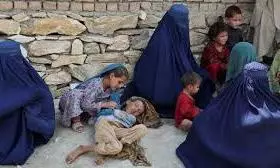
Taliban’s gender restrictions delay medical aid for women in earthquake zones
text_fieldsThe Taliban’s strict gender rules have severely delayed medical assistance for women in earthquake-hit areas of Afghanistan.
The Taliban’s “no skin contact with unrelated males” rule prevents male rescuers from helping women physically, even in life-threatening conditions. As a result, many injured women trapped under rubble went without care for hours.
Even 36 hours after the August 31 earthquake, relief efforts had not reached a single woman. The rules barred assistance, worsening the humanitarian crisis.
The Taliban’s ban on women studying medicine and working in public roles has created a shortage of female healthcare workers. This makes it harder to treat women in rural regions.
If a woman had no male relative nearby, rescuers sometimes dragged dead bodies by their clothes to avoid skin contact.
Many women had to wait for assistance from other villages. Rescue teams arrived late, and women were often ignored or deprioritised. Some women relied on strangers to pull them from the rubble.
More than 2,200 people died and 3,600 others were injured in the quake, the Afghan government reported. Many villages were flattened.
Aid groups say this crisis highlights the discrimination women face in Afghanistan.
The United Nations and human rights organisations warned that the Taliban’s gender policies worsen the suffering of women in emergencies. They urged disaster response plans that ensure equal access to aid for all.
Although the Taliban has not released gender-specific casualty figures, doctors, rescue workers, and women in affected areas confirmed that women were hardest hit.
Afghanistan already faces a shortage of healthcare workers, especially in women’s health. Last year, the Taliban banned women from enrolling in medical education, worsening the crisis.
In Afghanistan, cultural and religious norms enforced by the Taliban restrict interactions between men and women. Only a woman’s close male relative can touch her. Likewise, women cannot touch men outside their family. Female rescuers are not allowed to assist male victims, though women can help other women.












